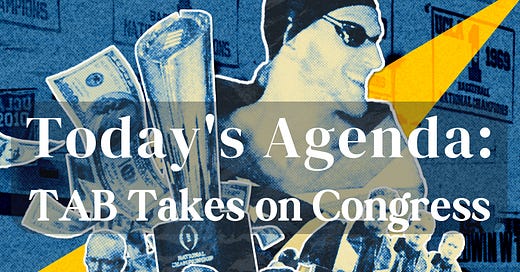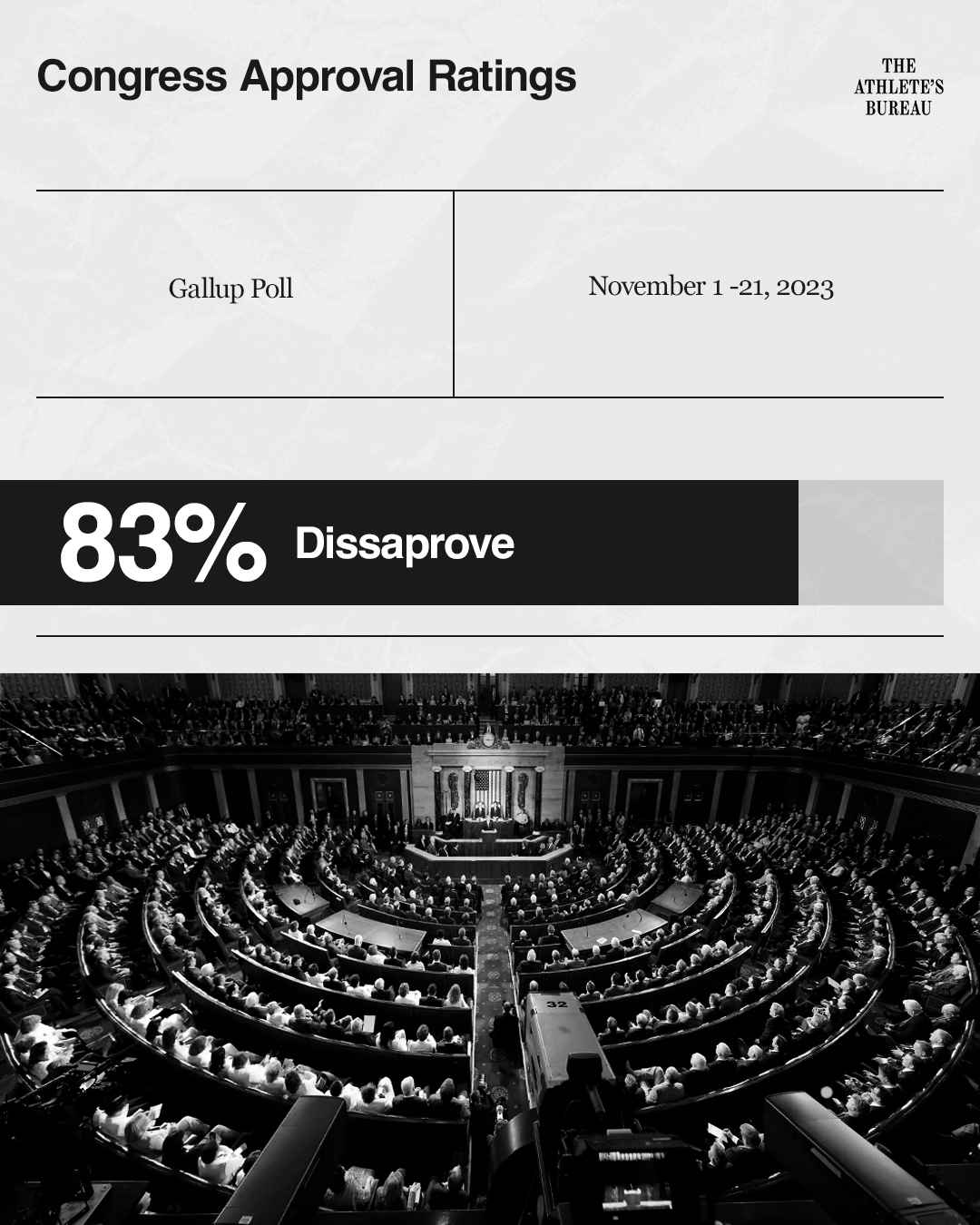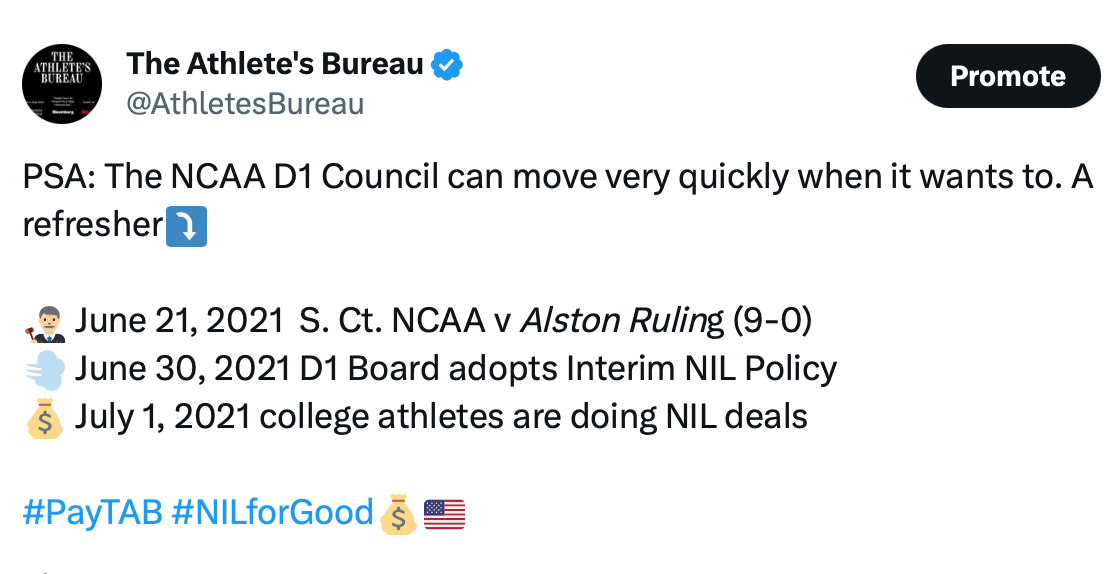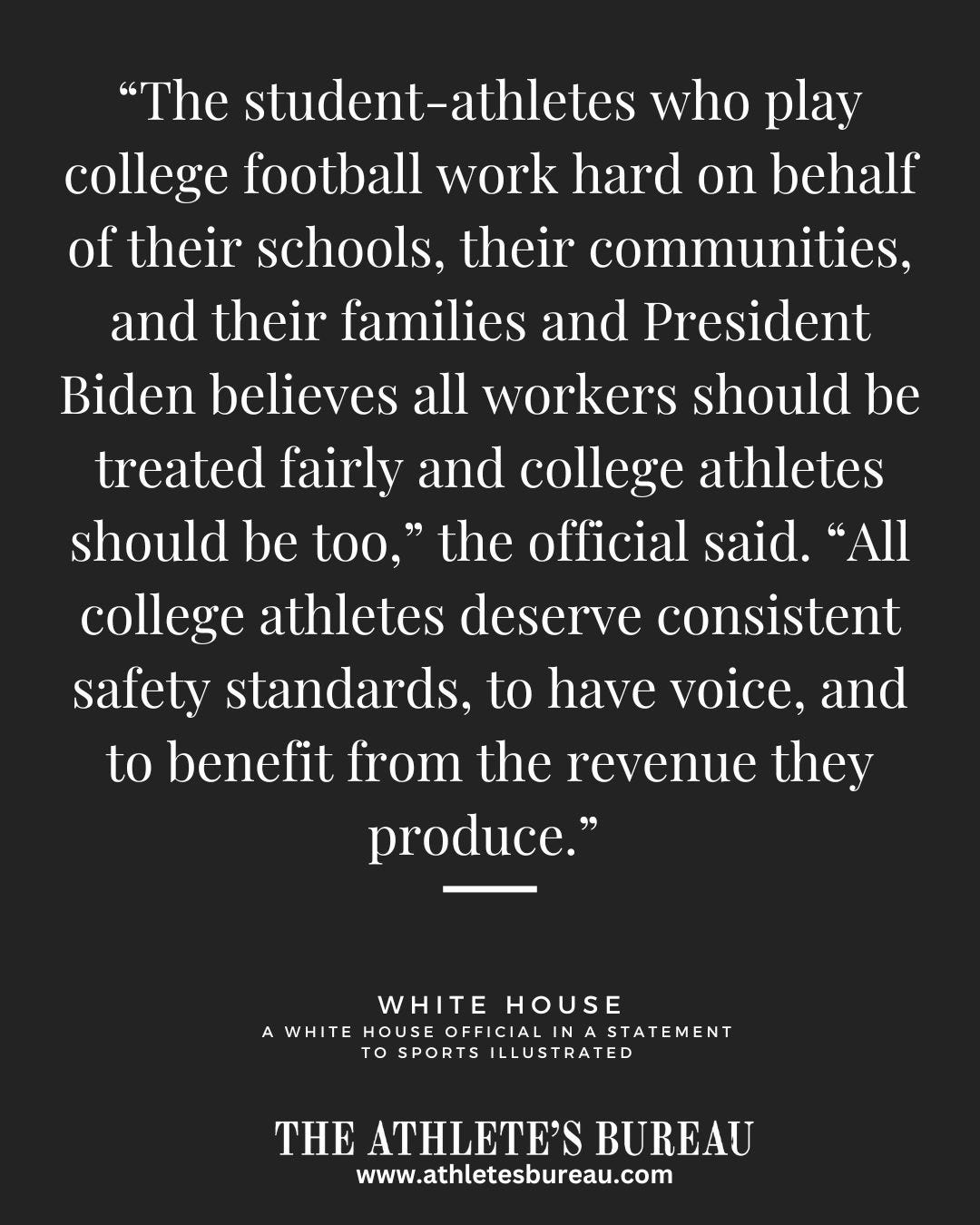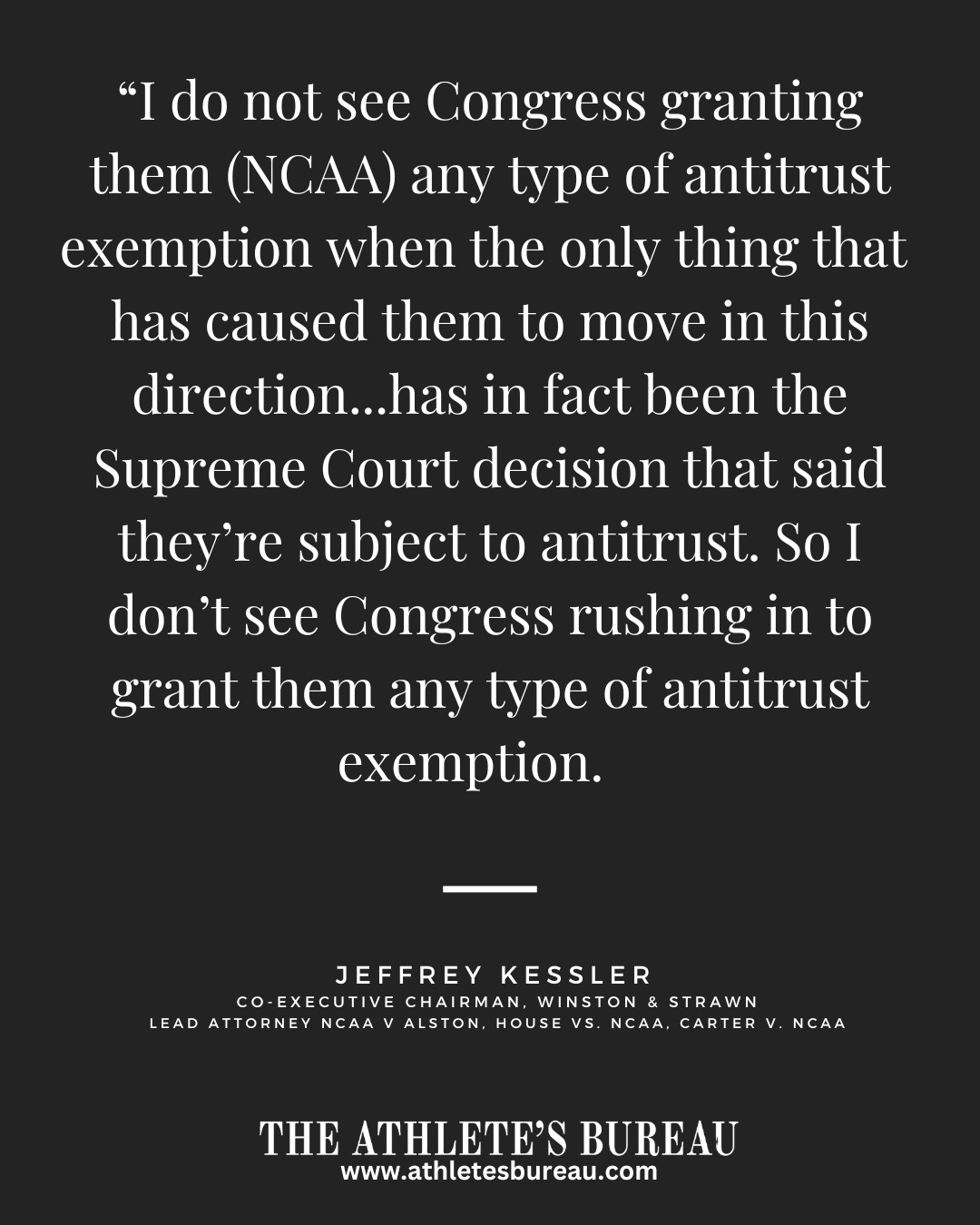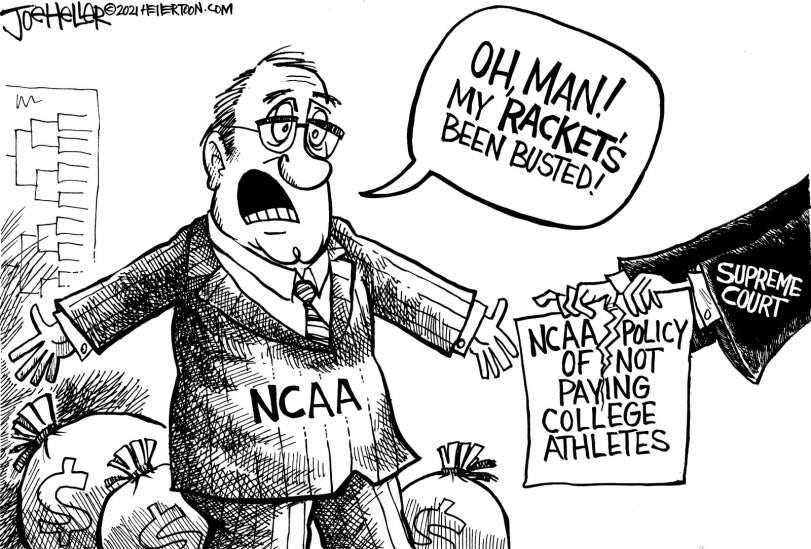Today’s Agenda: TAB Takes on Congress
TAB POV Newsletter today; TAB College Athlete Poll results later this week.
Publisher’s Message:
Welcome to a special edition of TAB. As we head into the final week of Congress before the new year, we focus on the NCAA’s recent lobbying efforts in Congress and what it means for college athletes. Later this week we will share our first TAB College Athlete Poll results so you can learn what real athletes across the country think about all of this.
As you know, here at TAB, we believe college athletes are not only entitled to their share of the revenue they help to create, but that it is inevitable their dues will be paid. Moreover, we predict it will happen a lot sooner than people expect. TAB is here to help college athletes understand their rights—as they continue to evolve—and to maximize the economic opportunity for their benefit and for the benefit of their families and their communities.
To be clear, we don’t think our point of view is controversial at all. The American public, courts, and officials of all ranks, all the way up to the White House, have stressed the need for the NCAA to do the right thing and begin sharing revenue with college athletes. And we are grateful to all of the brands and individuals that have invested in college athlete NIL, proving that there exists a huge marketplace for college athletes’ NIL, and that it’s been there all along.
As previously reported in TAB, NCAA President Charlie Baker recently unveiled a proposal to begin the process of allowing athlete compensation directly from schools. The proposal, while an important first step, still needs to be fleshed out and formally adopted by the D1 Council and Board of Governors. But it begins to put Baker on the right side of history and will finally allow college athletes to rightfully share in the billions of dollars of value they create.
The main fly in the proverbial ointment is the NCAA’s insistence that it needs an antitrust exemption from Congress to finally do the right thing. We believe such an exemption is completely unwarranted, and could lead to the rolling back of all of the gains made over the past decade. More importantly, we don’t believe the NCAA will get an antitrust exemption from Congress. We examine this and other facets of the NCAA efforts in Congress and what it means for college athletes in the latest issue of TAB. We’re glad you’re here.
Best,
Chase Griffin
TABulations
Public Sentiment is in Favor of College Athletes
We ran a sentiment analysis (November 1 - December 11, 2023) of the social and traditional media mentions of the NCAA lobbying efforts in Congress and found the response to be overwhelmingly negative. Across the board, momentum for college athlete compensation is growing daily. Politicians are aware that bills limiting the economic rights of college athletes are perceived negatively and do not want to be on the wrong side of public sentiment during an election year. Moreover, showing support for such bills creates an unnecessary risk for them (elected officials) at the polls in the upcoming 2024 elections, as awareness and support for revenue sharing with college athletes grows in traditional and local media (where voters live).
Congressional Approval Ratings Remain Very Low
The NCAA, by continuing to push for exemptions from Congress, is playing a very weak hand. There is near unanimity across the courts, state legislatures, states attorneys general, and public opinion that college athletes’ should enjoy the same rights and freedoms of every other American. Given certain levels of dysfunction and more pressing issues on their plate, Congress is unlikely to gain the support of sufficient majorities needed to pass the anti-athlete rights legislation the NCAA craves.
NCAA & Congress in the News
NCAA President Charlie Baker’s College Athlete Compensation Proposal
A good first step on the path of economic fairness for college athletes, but the fact that the NCAA is still seeking an Antitrust Exemption from Congress is concerning.
TAB POV: We appreciate Charlie Baker's recent proposal on athlete compensation, it is a long overdue admission that college athletes deserve a share of the billions of dollars in revenue we help generate. A federal antitrust exemption is not necessary to begin the implementation of this compensation proposal. If this proposal is sincere, the D1 Council and NCAA Board of Governors can and should adopt it in its December/January meetings and put it into effect by Fall of 2024. If the NCAA continues to push for a federal antitrust exemption, as a condition of adopting an athlete compensation plan, it will severely undermine any notion of goodwill in Charlie Baker’s proposal. Reminder: The NCAA can move very quickly when it wants to (or is forced to).
Senators Cory Booker and Richard Blumenthal invoke the Great Trust Buster
In a recent appearance on NBC News with Chuck Todd, the two Senators discuss a bipartisan bill that would establish a college athletics corporation among others things.
TAB POV: In this interview, Sen. Booker references President Teddy Roosevelt and his role in “saving college football” in the early 1900’s. To be clear, President Roosevelt was a “trust buster”—he did not create any new federal laws, but rather worked through the Department of Justice (DOJ) and the courts to enforce the Sherman Antitrust Act of 1890. This law continues to apply today—the creation of a new federal law isn’t necessary for the NCAA to remove its prohibitions on compensation to oncollege athletes.
TAB POV: We wholeheartedly support this bill and the related College Athlete Economic Freedom Act that will codify college athlete unfettered NIL rights. Our support notwithstanding, it is NOT necessary for this bill (or any federal bill) to pass for the NCAA to adopt the proposal that allows schools to begin compensating athletes.
The President and White House enter the discussion squarely on the side of college athlete rights.
In a recent meeting with a distinguished group of former college athletes, the White House signaled three principles that are important to them: 1) better athlete safety standards, 2) college athletes have a voice in the governance of college athletics, and 3) Athletes receive a share of the revenue they create.
TAB POV: The White House overt support of college athletes’ economic rights will have a huge impact and is much appreciated. With these measures set as the standard, we can infer that any legislation lacking these criteria could be met with a veto. This is a massive, and under-reported, development on the side of college athletes and decreases the likelihood that the NCAA will get the antitrust exemption they are pushing for. President Biden, has a Teddy-Roosevelt-size opportunity to pave way for college athlete economic rights. TAB will be following his actions closely during the upcoming election year and reporting over time.
In Conclusion
It is important to acknowledge that the reason the NCAA is going to Congress is that they are losing everywhere else. Due to the heroic and successful efforts of attorneys like Jeffrey Kessler and others, college athletes are closer than they have ever been to receiving the true fair share of the value we create. In a recent interview with Gabe Feldman’s Sportswise Podcast, legendary sports attorney, Jeffrey Kessler shared his views on the prospects of the NCAA receiving an antitrust exemption from Congress.

